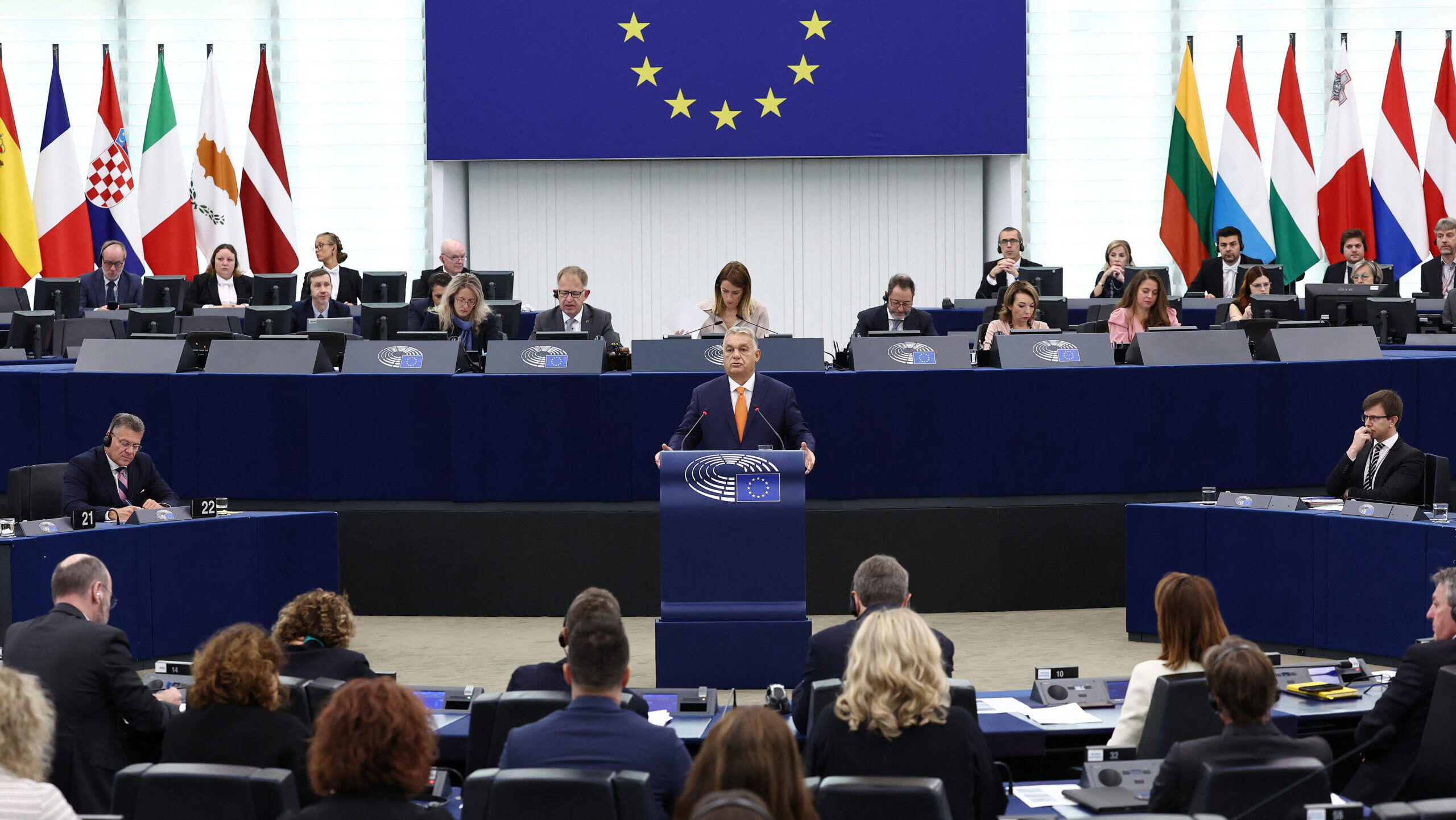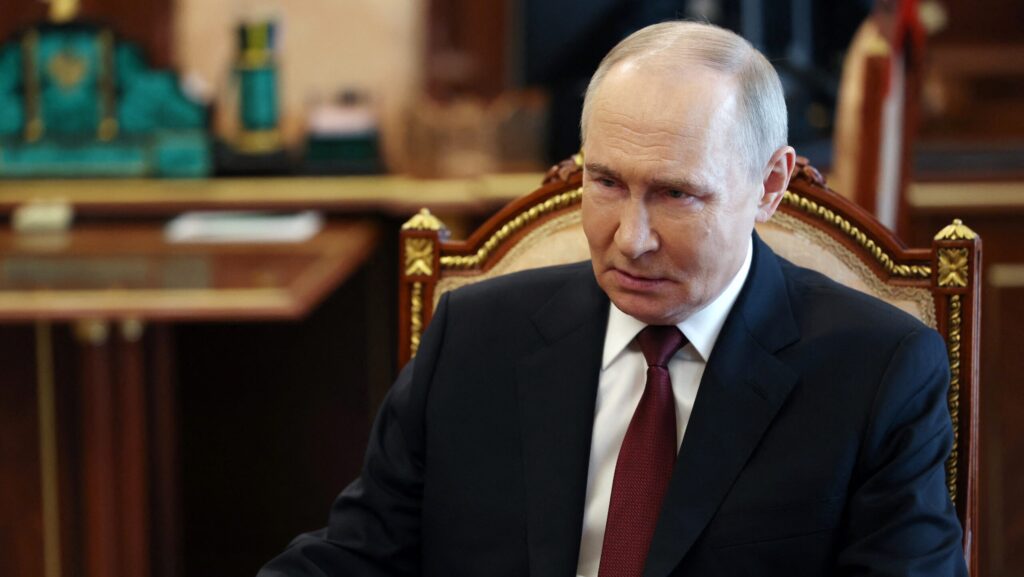On Wednesday morning Hungarian Prime Minister Viktor Orbán presented the programme of the Hungarian EU Presidency to the plenary session of the European Parliament in Strasbourg. In accordance with EU tradition, this session is intended to provide an opportunity for the leaders of political groups and MEPs to discuss the presidency programme, pose questions to the prime minister of the country holding the rotating presidency, and engage in a technical debate on the challenges facing the EU. However, today’s debate was far from what it should have been; the priorities of the rotating presidency programme and the challenges the EU is facing were primarily addressed by one individual—Viktor Orbán.
The Hungarian Prime Minister began his speech by outlining the challenges and achievements of Hungary’s first Presidency in 2011. He noted that the EU still faces many obstacles, as the countries involved in the integration process continue to recover from the financial crisis of 2008, alongside the fallout from the Arab Spring, which triggered the migration crisis in 2015. ‘In 2011, we dealt with the consequences of the financial crisis, the Arab Spring, and even the Fukushima disaster. However, today, the situation is much more serious—perhaps more so than at any point in the history of the Union,’ he warned.
Europe’s Slow Agony
One of the most pressing issues, according to the prime minister, is the war in Ukraine, which he described as a European conflict with escalating consequences. ‘There is a war raging in Ukraine, and this has ripple effects throughout Europe. Severe conflicts are also affecting the Middle East and Africa, all of which carry the risk of further escalation,’ he opined. He linked these geopolitical tensions directly to the migration crisis, stating: ‘The migration crisis has now reached levels not seen since 2015, with illegal migration and security threats potentially leading to the collapse of the Schengen Area.’
PM Orbán also referenced concerns raised by influential European leaders about the EU’s global competitiveness. He cited former European Central Bank President Mario Draghi, who has warned that Europe faces a ‘slow agony’ due to its decreasing competitiveness, while also echoing French President Emmanuel Macron’s concerns: ‘President Macron has said that Europe may die within two or three years as it is being pushed out of its markets.’ These quotes, he argued, underscore that the EU stands at a crossroads where critical decisions must be made about its future.
‘The EU’s economic growth has consistently lagged behind that of the United States and China for the past two decades’
In his address, Prime Minister Orbán provided an overview of Hungary’s progress during its EU presidency, mentioning that his government had led 585 Council working group meetings, chaired 24 ambassadorial meetings, and organized 69 official and 92 informal presidency events.
Touching on economic issues, PM Orbán stressed the importance of addressing Europe’s diminishing global competitiveness. ‘The EU’s economic growth has consistently lagged behind that of the United States and China for the past two decades. Our productivity is growing slower than that of our competitors, and our share of global trade is shrinking.’
PM Orbán also touched on Europe’s energy future, warning against the illusion that renewable energy alone will solve the continent’s energy problems. ‘Even if we meet all our renewable energy goals, fossil fuels will still determine energy prices for many years to come, at least until 2030,’ he said, urging European leaders to confront this reality. He also voiced concerns about the European Green Deal, stating: ‘The goal was to create green jobs, but in reality, deindustrialization has led to job losses.’
Saving Schengen from Illegal Migration
Turning to migration, PM Orbán reaffirmed Hungary’s long-standing position that protecting the EU’s external borders is essential. ‘Europe has been under migration pressure for years, especially on its external borders, and the Union must defend these borders. Hungary has fought political battles on this issue since 2015, and we’ve seen countless initiatives and proposals—all of which have failed because they lacked one key element: external hotspots. Without these, we cannot protect Europeans from illegal migration,’ he argued. He also criticized the EU’s asylum system, stating, ‘The EU’s asylum system is not working. Illegal migration has increased antisemitism, violence against women, and homophobia in Europe. These are the facts, whether we like them or not.’
🇭🇺🇪🇺PM Orbán: Migration and security threats could disintegrate the Schengen Area
— Zoltan Kovacs (@zoltanspox) October 9, 2024
🇭🇺 @PM_ViktorOrban issued a stark warning during his speech at the European Parliament in Strasbourg, pointing out that migration and security threats are pushing the Schengen Area towards… pic.twitter.com/K7wODTVnbs
Viktor Orbán proposed regular Schengen Summits, where EU heads of state and government could meet to discuss Schengen-related issues, similar to the Eurozone summits that were institutionalized after the 2008 financial crisis. ‘We need a similar political commitment to address the Schengen Area’s current crisis, and this can only be achieved through high-level political engagement,’ he urged.
In addition to migration, the prime minister also discussed the enlargement of the Schengen Area, advocating for the inclusion of Bulgaria and Romania.
The EU Must Change
PM Orbán concluded his speech by emphasizing Hungary’s broader goals for its EU presidency, particularly focusing on economic competitiveness and migration. He reaffirmed his belief in a strong, secure Europe and Hungary’s role in achieving that vision. ‘Our Union must change. Hungary is here to be the voice of that change and to be a catalyst of it,’ he declared, calling for pragmatic solutions to Europe’s crises.
‘We Hungarians are part of the European Union not for what it is, but for what it could be. As long as we see even the slightest chance to help Europe become what it can be, we will continue to fight for it,’ he concluded. ‘Our presidency’s success will be the Union’s success. Let’s make Europe great again.’
A Debate Without a Debate
Following the prime minister’s speech, European Commission President Ursula von der Leyen took to the podium and delivered a series of personal and politically charged remarks. Comparing the war in Ukraine to the Hungarian Revolution of 1956, von der Leyen stated: ‘There is a country that blames the invaded for being attacked, not the invader. Would they ever blame the Hungarians for the Soviet invasion of 1956? Or the Czechs and Slovaks for the Soviet repression of 1968? Or the Lithuanians for the Soviet crackdown of 1991?’
The Commission President also accused Hungary of drifting away from the single market. True to the style of a typical Hungarian opposition politician, von der Leyen then unleashed a barrage of mostly unfounded accusations that the left often levels against Hungary, including concerns about its good relations with China and Russia, as well as the issue of Russian guest workers in Hungary. At this point, the debate in the European Parliament began to resemble a typical session in the Hungarian Parliament, where opposition MPs frequently hurl baseless accusations at the governing parties and the prime minister.
In his response, Viktor Orbán addressed this by stating: ‘I deliberately did not raise our differences because, as the Council presidency, we are working on behalf of Europe. It is not appropriate to discuss these differences of opinion when we are focusing on the presidency.’ Orbán further remarked that the Commission has transformed into ‘a political weapon’ rather than remaining neutral and concentrating on the protection of EU treaties. Von der Leyen actually left afterward; she did not wait for the end of the ‘debate’.
‘The left-wing majority Parliament has long since abandoned its role as a platform for genuine discussion’
The leaders of the European Parliament’s political groups—the European People’s Party (EPP), the Socialists and Democrats (S&D), Renew, the Greens, and the far left—continued their long-standing criticism of Hungary, echoing the accusations made by the Commission President. In response to the allegations—including violations of the rights of the LGBTQ community, relations with Russia and China, disregard for the rule of law, corruption, and the poor performance of the Hungarian economy—PM Orbán calmly refuted these unfounded claims by presenting the facts, emphasizing that this debate should not occur at this time or in this context.
Similarly disregarding the context and purpose of the debate, Hungarian left-wing MEPs used their speaking time for campaigning; therefore, their speeches are not even worth discussing in this article.
The lesson from today, which Viktor Orbán also addressed on Tuesday, is that a substantive and professional debate is not possible in the European Parliament, even when the programme of the Hungarian Presidency addresses issues critical to the future of Europe. The left-wing majority Parliament has long since abandoned its role as a platform for genuine discussion and has instead become a tool for smearing, accusing, and silencing dissenting voices that challenge the mainstream narrative.
Related articles:








